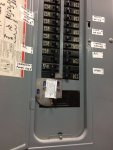builmord
Member
- 47
- 1
- 8
- Location
- dungannon, va
as I understand a lot of generator connections are by extension cords. where should the main bonding jumper be located when your generator is connected to your house panel by a cord attached receptacle connection . leaving the main bonding jumper on the gen will allow a parallel path if a equipment ground is part of the cord. starting the gen with the cord unplugged would present a shock hazard as the generator would not be grounded. and disable any gfci receptacles that are part of the generator package. would it be safer to keep the main bonding jumper in the generator to protect it and use a 3 wire , no ground to feed a house panel where the main bonding jumper for the house panel would provide short circuit protection there . i assume the feeder from the generator is the same as that from the utility where their equipment is bonded and grounded on their side. and there is no equipment ground in their feeder. unless the entire system was hard wired with no receptacles to interrupt the circuit I think this set up would be safer., and from a cost standpoint cheaper , don't know if this is to code



